By James T. Madore, Newsday
Long Island could lose up to 28% of its jobs by Dec. 31 because of the coronavirus and subsequent economic shutdown, according to a report released Thursday.
The estimated net loss of up to 375,000 jobs stems from businesses never reopening, and from many of those that do reopen not being able to recall all the workers who were laid off or furloughed. The state Department of Labor reports that the Island had about 1.3 million nonfarm jobs last year.
About 270,000 people were laid off in Nassau and Suffolk counties in March and April, the height of the pandemic; only 48,000 jobs were recouped in May. The pink slips were most prevalent among low-wage employees, those with a high school diploma or less, and Hispanics — because those groups are heavily represented in the hardest-hit industries: restaurants/hotels, health care/social services and retail, the report states.
The coronavirus employment losses will mean less economic activity on Long Island — down an estimated $61 billion this year, the report projects. That would represent about 38% of the gross domestic product, the sum of all goods and services produced here.
Consumer spending accounted for about 70% of Long Island’s 2018 GDP of $162.4 billion, according to the most recent data from the federal Bureau of Economic Analysis.
“Earnings and spending losses may be even greater in 2021 owing to prolonged recovery within some sectors coupled with expiring unemployment benefits,” said the report’s author, HR & A Advisors, an economic development consulting firm in Manhattan.
The leader of the HIA-LI, one of Long Island’s largest business organizations, agreed, saying business owners are reluctant to invest in buildings, equipment and people until a COVID-19 vaccine becomes available.
“The report’s numbers are spot on,” said Joe Campolo, a business law attorney and chairman of the group formerly called the Hauppauge Industrial Association. “Right now, businesses don’t know if they’re going to make it. Until there’s a vaccine, we’re going to be hurting,” he said on Thursday.
The counties commissioned the 99-page report in April to bolster their lobbying for additional federal and state aid. HR & A consultants estimated the 2020 revenue loss for Nassau is $360 million and for Suffolk, $325 million. Both are expected to see big drops in sales-tax collections because consumer spending is down.
“With the fastest rise of unemployment on record leading to a complete fall off of economic activity, this report further outlines the stark reality of our local economy,” Nassau County Executive Laura Curran said in releasing the report at a Melville event with Suffolk County Executive Steve Bellone. “We cannot recover from this devastating crisis alone — Washington needs to step in now with support for local governments, so we can continue to provide vital services for our residents,” she said.
Curran and others pointed to the report’s finding that Hispanics experienced a disproportionate share of layoffs because of their strong representation on the payrolls of tourism and hospitality businesses, which were shut down for more than three months.
For example, restaurants, hotels and other hospitality businesses shed about 65,000 jobs in the pandemic’s first two months, or two thirds of the sector’s total work force. And Hispanics make up 27% of the sector’s work force, the report states.
“This pandemic has caused hundreds of thousands of Long Islanders to lose their jobs, shuttered businesses, and turned our local economy upside down,” Bellone said. “This economic devastation will be extended for more than a decade if the federal government doesn’t provide disaster aid to our region.”
The report predicts it will take two years for restaurants, hotels, tourist attractions, warehouses, recreation businesses and arts organizations to rebound, and even then they will have 25% fewer employees than before the virus struck.
Faring somewhat better, with a recovery period of one year, is a group that includes real estate agents, retail stores, farms, construction, utilities, health care, education, manufacturing and trade companies. Still, 15% of those jobs will be permanently lost, the report states.
The quickest recovery — six months — will occur in the sector that includes finance, insurance, information, professional and technical services, and government, with only a 5% reduction in total employment.
“Recovery will occur in waves, with the starting point and duration differing by industry depending on public policy interventions, industry adaptivity, firm-worker dynamics and business size,” the report states.
The report, costing up to $130,000, was paid for by the counties’ industrial development agencies using fees collected from developers. Among those contributing research were Hofstra University, the developers’ group Association for a Better Long Island, and the HIA-LI.
The report provides further evidence for economists’ predictions that the recession won’t end quickly, said Steven Kent, an economics professor at Molloy College and former analyst at the investment bank Goldman Sachs in Manhattan.
“This analysis suggests a rapid v-shaped recovery is unlikely on Long Island; it’s going to take a couple of years and resemble the Nike Swoosh logo,” he said on Thursday. “We’ve had a dramatic dip in economic activity, faster than any other economic downturn. So, the recovery is going to take some time.”
Read it on Newsday’s website.









